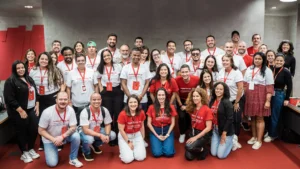How professionals and companies can prepare for the changes that technology brings to the business world
Technology accelerates transformations in the world – and the economy follows suit. In the 21st century, industrial logic gives way to services; the machine is not the center of attention, but the human being. Long-term planning becomes less valued than the ability to change quickly and readjust the route to continue growing.
These are some of the principles of the New Economy, which brings a new perspective on how to structure and lead a company. Do you want to know what the New Economy is? The iFood team will explain everything about the subject in videos published every Tuesday on social media.
In the first video of the series, Diego Barreto, vice president of finance and strategy at iFood and an expert on the subject, sums up the principles of the New Economy: he is the author of the bestseller New Economy: understand why the entrepreneurial profile is swallowing up the traditional entrepreneur Brazilian, from Gente publishing house. Here are some of the main points he listed for those who want to know more about it.
After all, what is New Economy?
“The New Economy is a process in which a series of technologies begin to impact a business model. This impact generates a radical change in the way companies are managed and in the way they position themselves and how they deliver their product or service.”
What are your principles?
“The pillars of the New Economy have to do with the ability to understand what is happening and, as a consequence, change. The New Economy understands that today's extremely connected world demands constant evolution. Being in the New Economy means accepting that the new needs to be introduced into your company, your management, your decisions. If something changes, you need to be able to absorb it.”
What is the profile of the leader in the New Economy?
“In Brazil in the 'old economy', there are basically managers, people who are capable of understanding how to implement and maintain an execution method, but this has nothing to do with leading. Leadership is about engaging and making people believe in something greater, leaving their natural stage to understand what skills are necessary to reach that greater stage. In the 'old economy', the leader cares little about engagement because everything is more linear, more stable, less connected. But the world has increasingly changed towards this ultra connection, towards agility and complexity. The manager has medium and long-term plans; the leader makes adjustments much faster.”
What changes in company planning?
“The New Economy moves away from the pattern of planning for a year and then following it month by month to monitor what was budgeted and achieved, the 12-month goals. If we admit that the world is much more connected and more entropic, we will see that it is no longer possible to plan for one year. You need to have a clear vision, so people know where to go. Planning in the New Economy is about understanding the direction and making very short-term adjustments very quickly.”
Is iFood part of the New Economy?
“Yes, firstly because he thinks big, he has a clear vision. Secondly, entrepreneurship is very present at iFood. Thirdly, here transparency is radical: to be agile, information has to be on the table, people need to say what is happening. iFood is a New Economy company because it has agility at its core and is little attached to dogmas.”
What are good books to understand the subject?
“To read more about the New Economy, I suggest: From Idea to Billion, by Daniel Bergamasco; Green-Yellow Unicorn, by Paulo Veras, Principles, by Ray Dalio; and “Exponential Organizations”, by Salim Ismail, Michael S. Malone and Yuri van Geest.


